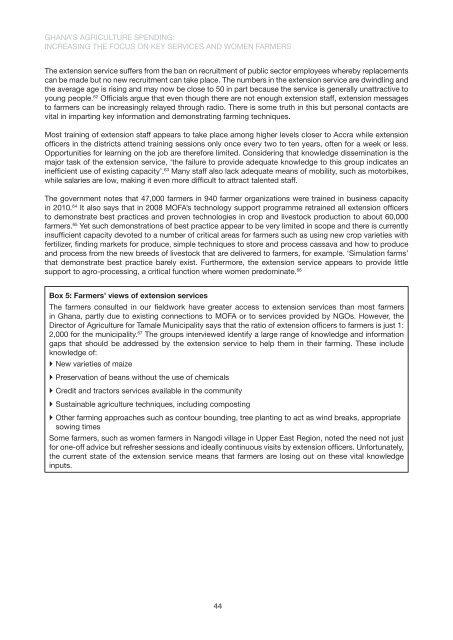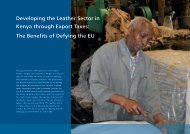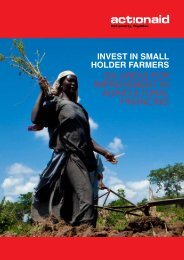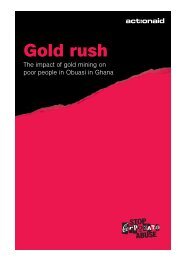IMPROVING AFRICAN AGRICULTURE SPENDING ... - Africa Adapt
IMPROVING AFRICAN AGRICULTURE SPENDING ... - Africa Adapt
IMPROVING AFRICAN AGRICULTURE SPENDING ... - Africa Adapt
You also want an ePaper? Increase the reach of your titles
YUMPU automatically turns print PDFs into web optimized ePapers that Google loves.
GHANA’S <strong>AGRICULTURE</strong> <strong>SPENDING</strong>:<br />
INCREASING THE FOCUS ON KEY SERVICES AND WOMEN FARMERS<br />
The extension service suffers from the ban on recruitment of public sector employees whereby replacements<br />
can be made but no new recruitment can take place. The numbers in the extension service are dwindling and<br />
the average age is rising and may now be close to 50 in part because the service is generally unattractive to<br />
young people. 62 Officials argue that even though there are not enough extension staff, extension messages<br />
to farmers can be increasingly relayed through radio. There is some truth in this but personal contacts are<br />
vital in imparting key information and demonstrating farming techniques.<br />
Most training of extension staff appears to take place among higher levels closer to Accra while extension<br />
officers in the districts attend training sessions only once every two to ten years, often for a week or less.<br />
Opportunities for learning on the job are therefore limited. Considering that knowledge dissemination is the<br />
major task of the extension service, ‘the failure to provide adequate knowledge to this group indicates an<br />
inefficient use of existing capacity’. 63 Many staff also lack adequate means of mobility, such as motorbikes,<br />
while salaries are low, making it even more difficult to attract talented staff.<br />
The government notes that 47,000 farmers in 940 farmer organizations were trained in business capacity<br />
in 2010. 64 It also says that in 2008 MOFA’s technology support programme retrained all extension officers<br />
to demonstrate best practices and proven technologies in crop and livestock production to about 60,000<br />
farmers. 65 Yet such demonstrations of best practice appear to be very limited in scope and there is currently<br />
insufficient capacity devoted to a number of critical areas for farmers such as using new crop varieties with<br />
fertilizer, finding markets for produce, simple techniques to store and process cassava and how to produce<br />
and process from the new breeds of livestock that are delivered to farmers, for example. ‘Simulation farms’<br />
that demonstrate best practice barely exist. Furthermore, the extension service appears to provide little<br />
support to agro-processing, a critical function where women predominate. 66<br />
Box 5: Farmers’ views of extension services<br />
The farmers consulted in our fieldwork have greater access to extension services than most farmers<br />
in Ghana, partly due to existing connections to MOFA or to services provided by NGOs. However, the<br />
Director of Agriculture for Tamale Municipality says that the ratio of extension officers to farmers is just 1:<br />
2,000 for the municipality. 67 The groups interviewed identify a large range of knowledge and information<br />
gaps that should be addressed by the extension service to help them in their farming. These include<br />
knowledge of:<br />
``New varieties of maize<br />
``Preservation of beans without the use of chemicals<br />
``Credit and tractors services available in the community<br />
``Sustainable agriculture techniques, including composting<br />
``Other farming approaches such as contour bounding, tree planting to act as wind breaks, appropriate<br />
sowing times<br />
Some farmers, such as women farmers in Nangodi village in Upper East Region, noted the need not just<br />
for one-off advice but refresher sessions and ideally continuous visits by extension officers. Unfortunately,<br />
the current state of the extension service means that farmers are losing out on these vital knowledge<br />
inputs.<br />
44













